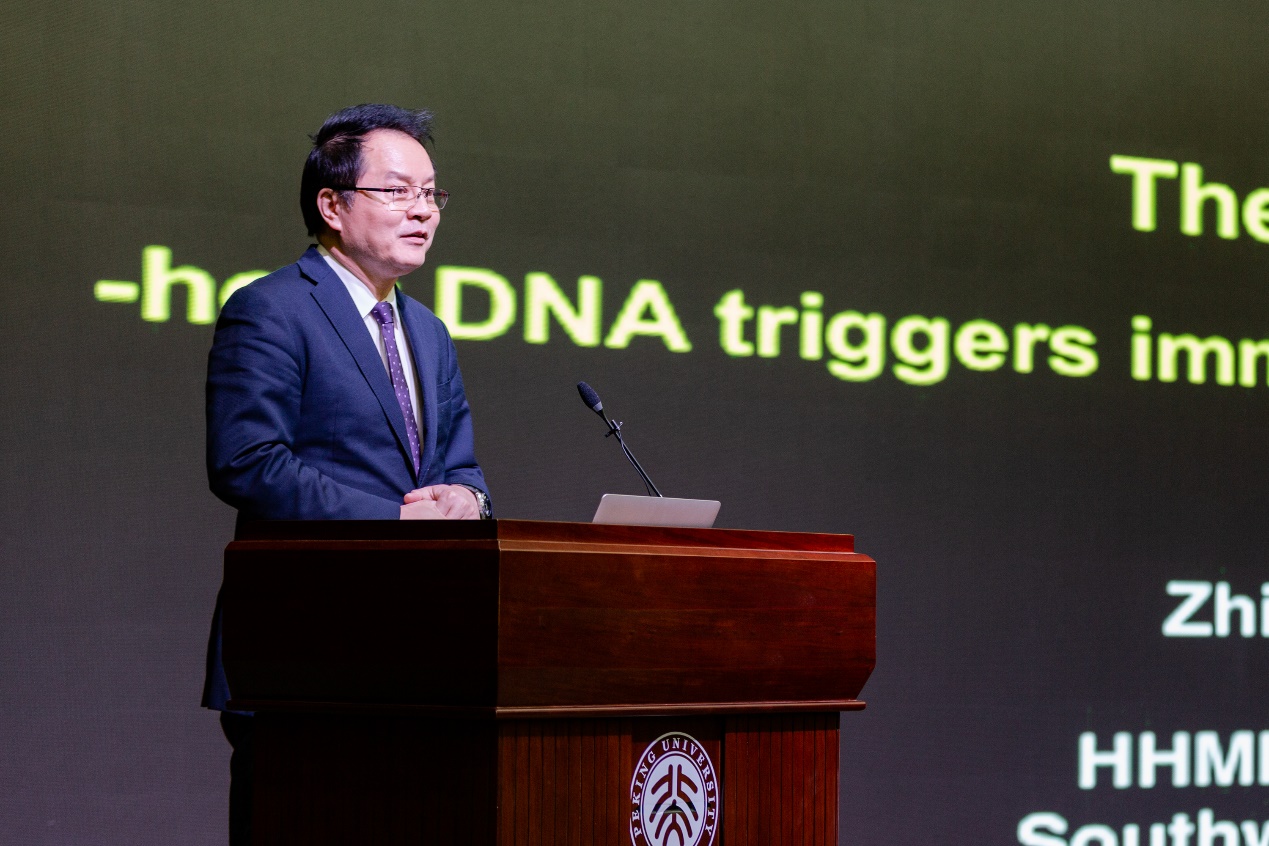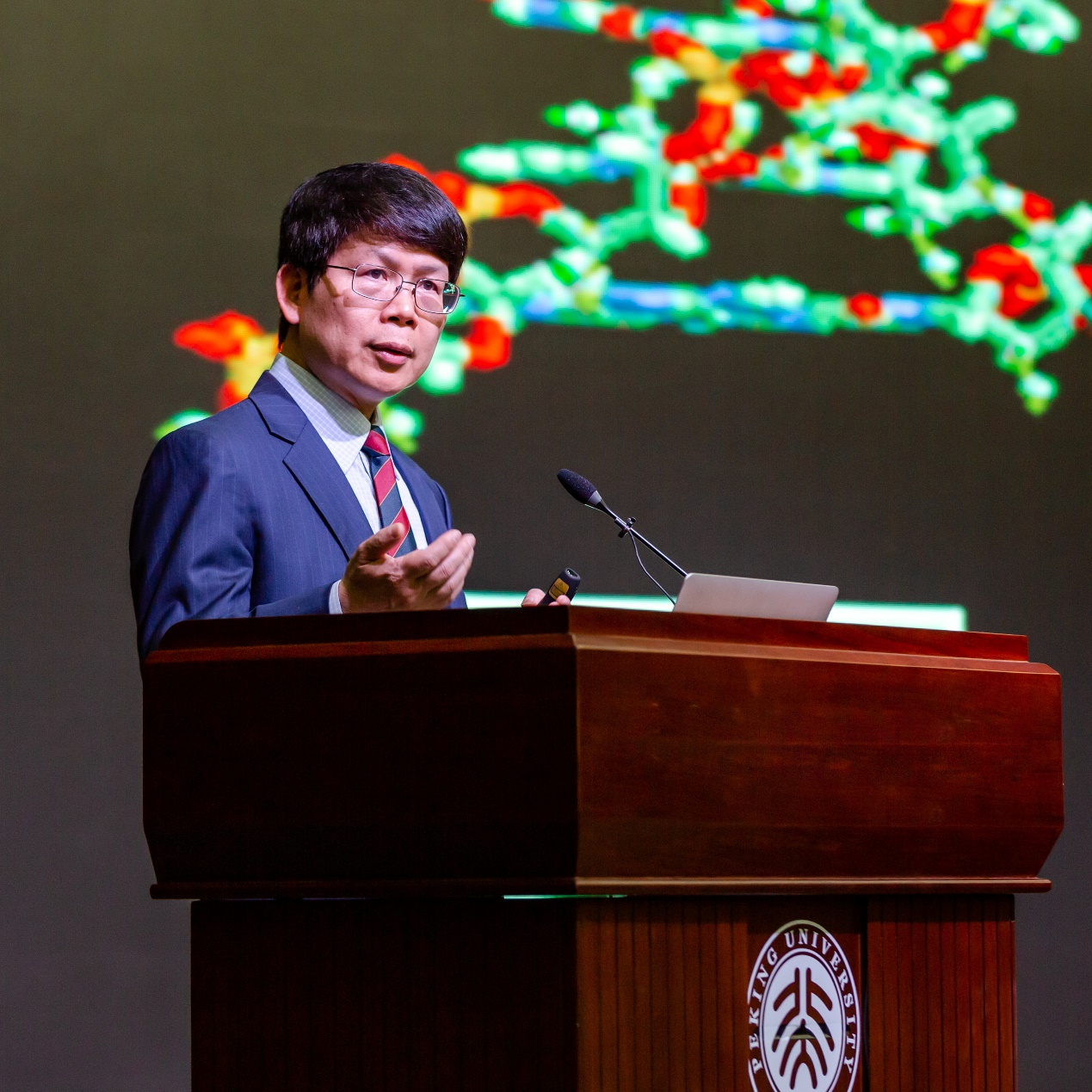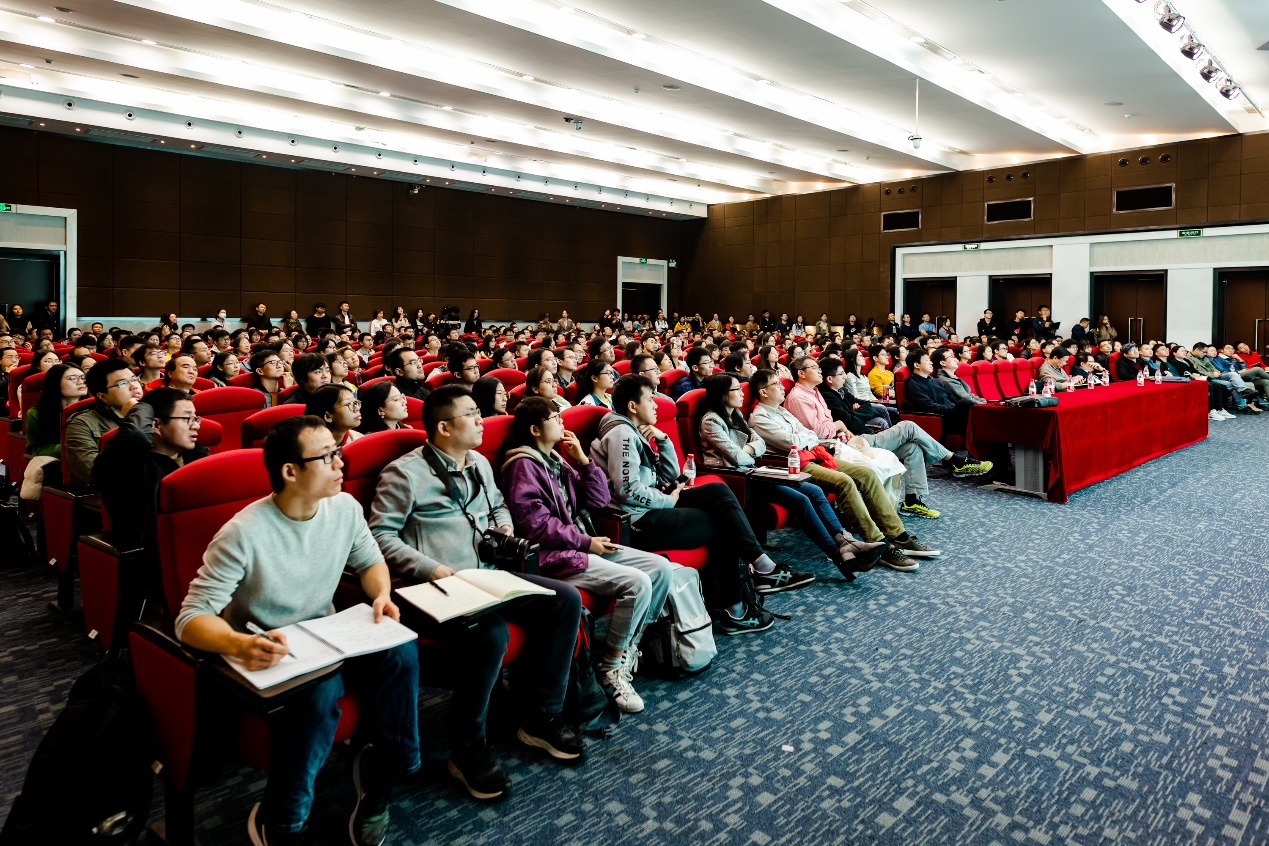[Peking University Global Fellowship] Professor Zhijian “James” Chen delivers a lecture at PKU
Nov 05, 2019
Peking University, Nov. 1, 2019: Professor Zhijian “James” Chen, winner of the 2019 Life Science Breakthrough Prize, visited Peking University and delivered an academic speech at the invitation of the Peking University Global Fellowship Program on October 24. This activity is organized by Peking University Biomedical Pioneering Innovation Center (BIOPIC) and Office of International Relations.
Zhijian “James” Chen delivered an academic report titled “The Dark Side of DNA - How DNA Triggers Immune Defenses and Autoimmune Diseases” in the Qiulin Lecture Hall of PKU School of International Relations at 10 am. The report was presided over by Professor Xiaoliang Sunney Xie , director of BIOPIC, and attended by nearly 400 students and teachers from PKU and other universities and research institutes. Before the report, Professor Xie introduced Zhijian “James” Chen’s academic achievements and research experience to the students and teachers present.
Xiaoliang Sunney Xie presiding over the lecture
In his lecture, Zhijian “James” Chen pointed out that DNA is the genetic material of most organisms and has self-evident significance to organisms. But DNA also has its dark side - inducing a natural immune response. However, how cells perceive and recognize DNA entering the cytoplasm due to their pathological changes or exogenous infection has been a mystery in the scientific research field for a long time.
Chen first reviewed his research group’s discovery of cGAS, a sensor of DNA in cells. Though it is a common understanding in immunology that DNA can activate the natural immune response, scientists had failed to find DNA receptors in cells for years. In 2013, through the classical means of biochemistry and mass spectrometry, Chen and his group proved that cyclic GMP - AMP (cGAMP) can lead to the dimerization activation of IRF3 and induce the natural immune response. Further, the group discovered the cGAMP cyclase cGAS in STING - IRF3 upstream and identified cGAS as the receptor in the cytoplasm that recognizes DNA. This discovery, as a great breakthrough in the field of DNA induced immune responses, solved the problem that has puzzled the academic circles for many years.
Chen further explained the important roles of cGAS and cGAMP in natural immunity and the occurrence and treatment of human diseases. He pointed out that apart from the significance of cGAS to the regulation of natural immunity in mammals, its homologous proteins are also important molecules for bacteria to resist the invasion of phages. This evolutionary conservatism also indicates that cGAS plays an important and extensive role in the regulation of natural immunity. Meanwhile, cGAS’s misidentification of the cell’s own DNA is also one of the causes of neurodegenerative diseases and autoimmune diseases, which makes cGAS a potential therapeutic target for the autoimmune disease AGS (Aicardi-Goutieressyndrome). On the other hand, cGAS-STING can participate in the process of cellular immunity against tumors by activating the proliferation of CD8+ T cells and thus enhancing PD-L1 mediated tumor immunotherapy. Moreover, 2’,3’-cGAMP, the substrates of STING, has great potential to participate in the clinical treatment of tumors as small-molecule drugs due to its small molecular weight, high specificity of binding with STING, and low Kd value.
Chen delivering his speech
Back to the discussion on the mechanism of cGAS, Chen elaborated on the activation mechanism of cGAS-STING from the perspective of structural biology and biochemistry. After binding STING with cGAMP, the ligand binding domain (LBD) of STING generates a 180° rotation, leading to STING dimerization and further oligomerization, and the oligomerized STING c-terminal recruits TBK1 and IRF3, which further leads to the phosphorylation activation of IRF3 by TBK1, and finally initiates the natural immune response. This mechanism makes the STING mutation a trigger for autoimmune disease and cGAS the inhibitors a potential drug for clinical intervention in autoimmune diseases.
As for the problems that need to be solved and the future research direction in this field, Chen believed that the future research focus of DNA-induced natural immunity is still to further analyze the detailed activation mechanism and to elaborate on the details of the mechanism. On the other hand, how to prevent cGAS-STING from being activated by the cell’s own DNA is also an important research topic. For example, the exposed genomic DNA during mitosis will not lead to the activation of cGAS-STING. Chen stressed once again that basic research should be linked with disease research, and the interpretation of the cGAS-STING signaling pathway not only has important theoretical research value, but can also provide evidence for drug development and clinical intervention in autoimmune diseases, neurodegenerative diseases, and tumors.
The report aroused a warm response from the audience, who asked questions and discussed actively. Zhijian “James” Chen not only answered a large number of academic questions but also gave his suggestions on laboratory management, research career planning, topic design, ways to face setbacks in research, and many other aspects.
During the event
Background Information:
Zhijian “James” Chen is a Howard Hughes Medical Institute (HHMI) Investigator, professor of molecular biology and director of the Inflammation Research Center at the University of Texas Southwestern Medical Center, and George L. McGregor Distinguished Chair in Biomedical Sciences.
Chen is one of the pioneers in the field of natural immunity and the discoverer of cGAS, cGAMP, MAVS and other important natural immunity molecules.
Chen has won several international awards, including the Lurie Prize in Biomedical Sciences in 2018 and the Breakthrough Prize in Life Sciences in 2019.
Written by: Shao Ruyang
Edited by: Zhou Yijing
Source: PKU News (Chinese)


